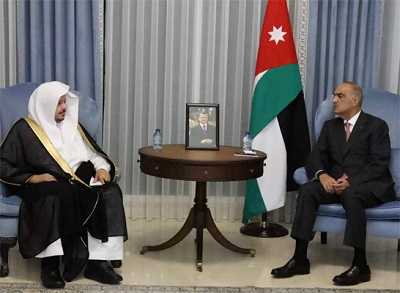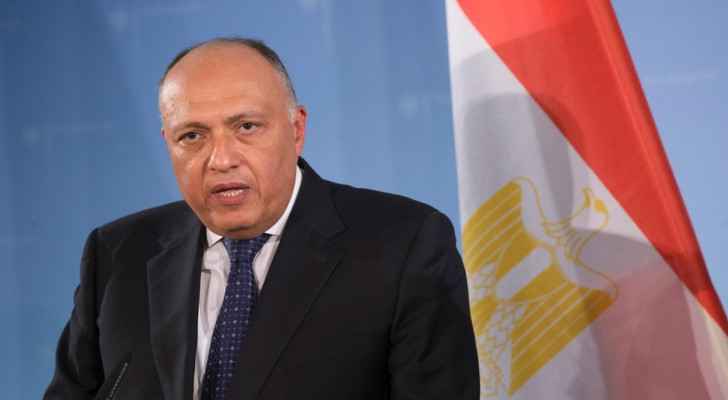Border security should top Egypt priorities following Sudan, Libya turmoil - By Sonia Farid, Alarabiya
Following the eruption of protests in Sudan and the military offensive in Libya, apprehensions of insecurity on Egypt’s western and southern borders have started growing. It was no coincidence that both ousted Sudanese President Omar al-Bashir and commander of the Libyan National Army (LNA) Khalifa Haftar visited Cairo as tensions reached their peak back home, in a demonstration of where Egypt’s bets were placed at the time.
It is difficult to predict at this point how susceptible Egypt is to a spillover of unrest. It is equally difficult to measure the sustainability of Egypt’s current alliances with both Sudan and Libya.
Egypt’s support for Haftar is not a surprise as, since launching Operation Dignity in 2014 in Benghazi, he has posed as the archenemy of Islamist militias and the only one capable of curtailing the growing influence of ISIS and similar groups. In fact, the kidnapping and beheading by ISIS of 21 Coptic Egyptian workers in Libya in 2015 was seen by many as retaliation for Egypt’s support for Haftar. Meanwhile, the executive authority in Tripoli, which sees Haftar’s offensive as a “coup,” as Libyan Prime Minister Fayez al-Sarraj put it, is recognized by the UN.
As a military strongman and commander of an army that has received the financial and logistical support of several allies, Haftar is the only hope Egypt has to secure its western border, which has been quite porous lately.
Egypt’s stance on Haftar can be compared to that of France, which reportedly backs him in the hope that his victory will achieve the kind of stability that would curb the influx of immigrants toward the Northern Mediterranean. Egypt fears a threat to its national security if Haftar fails to eradicate Islamist militias, as operatives would continue entering through the western desert.
With Sudan, the situation is a little different. Bashir and Egypt have not exactly been on the best terms for several reasons, including the dispute over the Halayeb Triangle, Sudan’s support for Ethiopia’s construction of the Renaissance Dam, and Sudan’s close ties with Qatar and Turkey. Bashir’s government also sympathized with Islamists and provided refuge to several Muslim Brotherhood members who fled from Egypt following the ouster of President Mohamed Morsi.
But the protests seem to have brought the two countries closer. Egypt has openly declared that it prioritizes Sudan’s stability and supports the will of the Sudanese people.
For Egypt, it makes no difference who is in charge, whether Defense Minister and former Vice President Awad Ibn Auf, who toppled Bashir, or Bashir’s de facto successor Lieutenant General Abdel Fattah Bourhan. Either way, having the military in power is in Egypt’s best interests. Not only will the southern border be secured, and the threat of immigrants flocking northwards in case of civil strife eliminated, but bilateral relations will also take a different turn.
Earlier reports of the expulsion of Muslim Brotherhood members from Sudan under Bashir had already signaled a possible rapprochement with Egypt, which can now make its backing of the post-Bashir government contingent upon an official anti-Islamist stance and a dissociation from countries that support the Muslim Brotherhood.
Haftar is expected to be a much closer ally to Egyptian President Abdel Fattah el-Sisi. If he emerges victorious, both would work together to clamp down on weapons smuggling and extremist militants crossing to either side. Every chance Haftar stands to stabilize Libya is also a chance for Egypt to protect itself against terrorist threats.
Through Libya, Egypt can seal off a vital passageway for armed groups. Through Sudan, which saw Bashir’s now disbanded National Congress Party as the last standing Islamist stronghold in the region, it can deal a blow to Bashir’s allies Qatar and Turkey.
If its southern and western neighbors embrace the same view of stability and adopt the same approach to national security, the Egyptian government can rest assured that neither protests nor armed struggles will be exported to its turf.
Egypt’s formula of eliminating Islamists and putting the military in charge, however, is not easily applicable in Sudan and Libya. The political complexity and number of warring factions in both countries make the situation there entirely different.
The parties that have stakes in the Sudanese political scene are too ferocious to promise a smooth transition. There is no guarantee that some parties will reach a peaceful understanding as far as the division of power is concerned. The situation is similarly intricate in Libya, as the fall of Tripoli to Haftar’s troops will neither give him legitimacy nor secure a final victory against Islamist militias.
It is hard to predict, therefore, if either country will achieve full stability in the near future, keeping Egypt’s borders fully secured.
Latest News
 King, Bahrain monarch stress need to maintain Arab coordination
King, Bahrain monarch stress need to maintain Arab coordination Security Council to vote Thursday on Palestinian state UN membership
Security Council to vote Thursday on Palestinian state UN membership Dubai reels from floods chaos after record rains
Dubai reels from floods chaos after record rains Khasawneh, Saudi Shura Council speaker discuss bilateral ties, regional developments
Khasawneh, Saudi Shura Council speaker discuss bilateral ties, regional developments Egyptian Foreign Minister condemns potential Palestinian displacement as 'war crime'
Egyptian Foreign Minister condemns potential Palestinian displacement as 'war crime'
Most Read Articles
- King, Bahrain monarch stress need to maintain Arab coordination
- Dubai reels from floods chaos after record rains
- Security Council to vote Thursday on Palestinian state UN membership
- Khasawneh, Saudi Shura Council speaker discuss bilateral ties, regional developments
- Tesla asks shareholders to reapprove huge Musk pay deal
- Jordan will take down any projectiles threatening its people, sovereignty — Safadi
- Hizbollah says struck Israel base in retaliation for fighters' killing
- Knights of Change launches nationwide blood donation campaign for Gaza
- Princess Basma checks on patients receiving treatments
- The mystery of US interest rates - By The mystery of US interest rates, The Jordan Times